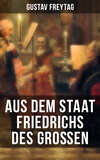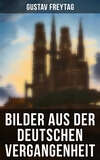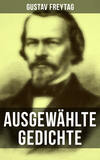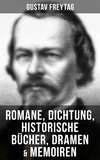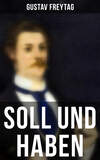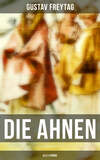Kitabı oku: «The Lost Manuscript: A Novel», sayfa 14
After this decision he left the ladies to their feelings.
"Your father is right," said Mrs. Hummel, "to leave the principal matter to us. With his harsh disposition thanks would come very ungraciously."
"Mother," said Laura, entreatingly, "you have more tact than I. Can you not go over there?"
"My child," answered Mrs. Hummel, clearing her throat, "that is not easy. This unfortunate occurrence of the dogs has left us women too much at variance. No, as you are the principal person now concerned, you must go over there yourself."
"I cannot visit the Doctor," exclaimed Laura alarmed.
"That is not necessary," said Mrs. Hummel, soothingly. "There is one advantage our neighborhood possesses-we are able to see from our windows when the men go out. You may then rush over to the mother and address your thanks for the son to her. You are very judicious, my child, and will know how to act."
Thereupon Laura took her seat at the window, not well pleased to sit as watcher upon her neighbors; this lying in wait was repugnant to her. At last the Doctor appeared on the threshold; he looked the same as usual; there was nothing chivalrous to be seen in him; his figure was slender and he was of middle height-Laura liked tall people. He had an intellectual countenance, but it was concealed by his large spectacles, which gave him a pedantic appearance; when he did smile his face became quite handsome, but his usual serious expression was not becoming to him. Fritz disappeared round the corner and Laura put on her hat with a heavy heart and went into the hostile house, which she had never yet entered. Dorchen, who was not in the secret, looked astonished at the visit, but with quick intuition connected it with the return of the Doctor and announced, of her own accord, that neither of the gentlemen were at home, but that Mrs. Hahn was in the garden.
Mrs. Hahn was sitting in the Chinese temple. Both women stood opposite each other with a feeling of embarrassment; both thought at the same time of their last conversation and to both the recollection was painful. But with Mrs. Hahn the danger to which Laura had been exposed at once overcame this natural nervousness. "Ah, you poor young lady!" she began, but while overflowing with compassion, with delicate tact she drew away from the Chinese building, feeling that it was not an appropriate place for this visit and invited her to sit on a little bench in front of the white Muse. This was the pleasantest spot about the house; here the orange tree smiled upon its donor, and Laura could bring herself into a grateful mood. She told her neighbor how deeply she felt indebted to the Doctor, and she begged her to say this to her son, because she herself in the confusion had not properly fulfilled this duty. She then entered into the necessary business about the bad shepherd. Good Mrs. Hahn was pleased with her thanks and in a motherly way begged Laura to take off her hat for a little while, as it was warm in the garden. But Laura did not take off her hat. She expressed in fitting terms her pleasure in the garden, said how beautifully it bloomed, and heard with satisfaction of the splendid orange tree which had been sent anonymously to Mr. Hahn, the fruit of which was sweet, for Mr. Hahn had celebrated the return of his son by an artistic drink, for which he had taken the first fruit of the little tree.
It was altogether a diplomatic visit, not extended unnecessarily; and Laura was glad when, on departing, she had repeated her compliments and thanks to the Doctor.
In Laura's secret record, also, the events of this day were very shortly disposed of. Even an observation she had begun on the happiness of the lonely dwellers in the wood remained unfinished. How was it, Laura? – you, who write down everything; who, when an insect or a sparrow hops in at the window, burst forth into verse! Here was an event influencing your whole life-danger, unconsciousness in the arms of a stranger, who, in spite of his learned aspect, is a handsome youth! This would be the time to depict and indulge in fancy dreams. Capricious girl, why does this adventure lie like a dead stone in the fantastic landscape that surrounds thee? Is it with thee as with the traveler, who, weary of the Alpine scenery, looks below him and wonders that this marvelous nature so little impresses him, till gradually, but perhaps not for years, the scenes pursue him, waking or dreaming, and draw him anew to the mountains? Or has the nearness of the wicked animal who occasioned the outrage impeded the flight of your soaring wings? There he lies before your threshold, red and ragged, licking his lips.
CHAPTER XII.
THE DEPARTURE FROM THE ESTATE
Autumn had come. The trees about the house had assumed their colored dress of decay. White webs hung over the stubble, and the dew drops lay upon them till the wind tore the woven fabrics away and bore them from field and valley into the blue distance. A happy pair went hand in hand about the place. This year the fall of the leaf did not affect the Professor, for a new spring had begun in his life; and his happiness was written in his countenance in characters which might be read by the most unlearned.
Ilse was betrothed. Modestly she bore the invisible crown which, according to the opinion of the household and neighborhood, now encircled her head. There were still hours in which she could scarcely believe in her happiness. When she rose early from her bed, and heard the trailing of the plough, or when she stood in the dairy amidst the clattering of the milk pails, her future appeared like a dream. But in the evening, when she was sitting near her beloved one, listening to his words and conversing on subjects serious and trifling, she would lay her hand gently on his arm in order to assure herself that he belonged to her, and that she was thenceforth to enter into the life in which his spirit moved.
The marriage was to take place before the winter, and before the lectures began at the University. For the Professor had petitioned against a long engagement and the father had yielded.
"I would gladly have kept Ilse with me over the winter. Clara must assume a portion of her duties, and the guidance of her sister would have been a great help to her. But it is better for you that it should be otherwise. You, my son, have sought the hand of my daughter after a short acquaintance, and the sooner Ilse accustoms herself to the life of the city, the better it will be for you both; and I think it would be easier for her in the winter."
It was a time of happy excitement, and the necessity of providing for the new household brought down the feelings of the betrothed from their state of exaltation to earthly things.
The Professor made a journey to the University. He went first to his friend.
"Wish me joy," he exclaimed; "have confidence in her and me."
The Doctor embraced him and never left his side during his stay. He accompanied him in all his shopping expeditions and assisted him in the arrangement of the rooms. Gabriel, who, from the visit of the country gentleman, had anticipated coming events, and who had become doubtful of his own indispensability, felt proud when the Professor said to him:
"Between you and me things are to remain as they were. Do your best to make yourself useful to my wife."
Then came Mr. Hummel. In the name of the family he extended his congratulations, and of his own accord offered the use of two rooms in his house which he himself did not occupy. But Laura was more anxious than all the rest about the new inmate. She burst forth in verse thus:
"How will she be, of sweet or lofty mien?
Proud, dignified, or charmingly serene?
My heart beats fast and thoughts in chaos seem!
Will fond anticipations prove a dream?"
When the Professor begged of her and her mother to receive his future wife with friendliness and help her in her arrangements, and when he added to Laura that he hoped she would be on a friendly footing with his bride, he did not guess how much happiness he had given that young heart, which felt an unquiet longing to attach itself devotedly to some one. The indefinite descriptions which he gave concerning the character of his intended made a very vague impression which to Laura became a frame in which she daily depicted new faces.
Meanwhile the women were occupied in the old house preparing Ilse's outfit. The approaching marriage of her sister had transformed Clara into a young lady; she helped and gave good advice, and in everything showed herself clever and practical. Ilse spoke of this in terms of praise one evening to her father and then threw her arms around his neck and burst into tears. The father's mouth quivered; he did not answer, but he held his daughter close to his heart. It fortunately happened that the last weeks before their separation were full of work and distraction. There was yet much to be done in the household and the father would not permit the betrothed couple to omit a single visit to his acquaintances in the neighborhood.
One of the first was to the family of Rollmaus. Ilse in a special letter had informed Mrs. Rollmaus of her betrothal; and this had created great excitement. Mrs. Rollmaus burst forth into a stream of triumph; but Mr. Rollmaus saddled his horse and rode to Bielstein, but not to the house. He inquired for the Proprietor at the gate of the court-yard and rode to meet him in the field. There he took him aside and began his congratulations with this short question:
"What is he worth?"
The question was answered numerically, and he seemed satisfied. For he turned his horse round, trotted up to the house and extended his congratulations to Ilse and her betrothed, whom he now looked upon as her equal, and this time he pressingly repeated his invitation to call. After his return, he said to his wife:
"I could have wished a better match for Ilse, but the man is not so bad after all."
"Rollmaus," replied the wife, "I hope you will behave properly on this occasion."
"What do you mean?" asked the Crown Inspector.
"You must propose the health of the betrothed couple at dinner, when they come."
The husband muttered a suppressed growl. "But I'll have none of your oratorical trash and sentiment; I will have nothing to do with that."
"The eloquence must be in the introduction," said Mrs. Rollmaus; "and if you will not do it, I will undertake it myself. You may merely propose the health."
The house of Rollmaus displayed its finest table linen and dinner service for the visit, and Mrs. Rollmaus showed not only a good heart but good cooking. After the first course she clinked her glass and began excitedly:
"Dear Ilse, as Mr. Rollmaus in proposing your health will express himself shortly and laconically, I take the occasion to mention beforehand that as old friends of your parents, we wish you joy from the bottom of our hearts. And as we have lived together as good neighbors, sympathizing both in misfortune and when there was an agreeable addition to the family, and as we have often rendered each other mutual assistance in household matters, it is very sad for us to think that you are going to leave our country. Yet we rejoice that you are going to a city where intellect and higher aims are appreciated. I will not be voluminous, therefore I beg of you both to remember us with true friendship."
She put her handkerchief to her eyes and Mr. Rollmaus expressed the family feeling generally, in four words:
"Health to the couple."
At departing Mrs. Rollmaus wept a little and begged the Proprietor to permit them to be at the marriage, though no other guests were to be present.
There was to be still another distraction. The Sovereign wished to stop on the way to his hunting castle and take breakfast in the old house.
"It is well. Ilse, that you are with us," said her father.
"But one does not know at all what such a person is accustomed to," rejoined Ilse, between pleasure and anxiety.
"His own cook will come over from the Forester's house; he will help. Only see to it that he finds something in the kitchen."
It was a day of busy preparation, and the children, the housekeeper and the workwomen sat among heaps of branches and autumn flowers, twining wreaths and garlands.
"Spare nothing," said Ilse to the old gardener; "he is the beloved father of our country. We, his children, bring him our flowers as a tribute."
Hans, with the help of the Professor, arranged immense emblems and monograms of dahlias.
The evening before the hunt the purveyor and cook, with their attendants, arrived. The purveyor begged leave to set the table in the garden. "The Sovereign will be accompanied by the necessary servants; the rest of the waiting may be done by the waiting-maids of the house. Country customs please his Highness."
On the morning of the chase the Proprietor rode in his best clothes to Rossau to receive the Sovereign, and the children thronged round the windows of the upper story, spying along the highway like bandits. Shortly before midday the carriage came up the hill and stopped at the door of the house. The Proprietor and Forester, who were riding on each side of the royal carriage, dismounted. The Sovereign descended with his suite, greeting them as he crossed the threshold. He was of advanced age and middle height; had a small delicate face, from which could be seen that in youth he had been considered a handsome man, with two intelligent eyes, beneath which were many small wrinkles. Ilse entered the hall and the Proprietor introduced his daughter in his simple way. The Sovereign greeted Ilse graciously with a few sentences and favored the Professor, who was presented to him as bridegroom of the daughter, with some attention; whereupon the Professor was invited by the master of the hounds to join the party at breakfast. The Sovereign stepped into the garden directly, praised the house and the landscape and recollected having been here with his father as a boy of fourteen.
Breakfast passed off admirably. The Sovereign asked questions of the Proprietor, that evinced a great interest in the condition of the country. When they arose from the table, he approached the Professor, asked various particular questions about the University, and knew the names of several of his colleagues. The answers and general demeanor of the Scholar induced him to prolong the conversation. He told him that he himself was somewhat of a collector. He had brought ancient coins and other antiques from Italy and any increase in his collection gave him much pleasure. And he was pleased to find that the Professor was already acquainted with several of the more important ones.
When the Sovereign, in conclusion, asked the Professor, whether he belonged to this country, Felix answered that accident had brought him there. It suddenly occurred to him that this was an opportunity, which might never recur, of making known to the highest power in the country the fate of the lost manuscript, and thereby, perhaps, gaining an order for further research in the residence. He began his account. The Sovereign listened with evident excitement. While cross-questioning him about it, he drew him further from the company and seemed so entirely engrossed in the affair as to forget the hunting. The master of the hounds, at least, looked at his watch often and spoke to the Proprietor of the interest, which the Sovereign seemed to take in his son-in-law. At last his Highness closed the conversation: -
"I thank you for your communication. I value the confidence which you have shown me. If I can be of any use to you in this matter apply directly to me; and should you happen to come into my neighborhood, let me know. It would give me pleasure to see you again."
When the Sovereign passed through the hall to the carriage he stopped and looked round. The master of the hounds gave the Proprietor a hint. Ilse was called and again made her obeisance, and the Sovereign in a few words thanked her for her hospitable reception. Before the carriage had disappeared from the farm-buildings the Sovereign again looked back to the house, and this civility was fully appreciated.
"He turned quite round," said one of the laborer's wives, who had placed herself with the working people near the evergreen arch by the barns.
All were contented and rejoiced in the graciousness and civility which had been given and received in good part. Ilse praised the Sovereign's attendants, who had made everything so easy; and the judicious questions of the ruler had pleased the Professor much. When the Proprietor returned in the evening, he related how well the chase had gone off, and that the Sovereign had spoken most kindly to him and had wished him joy of his son-in-law before everybody.
The last day that the maiden was to pass in her father's house came. She went with her sister Clara down to the village, stood by the window of the poor Lazarus, stopped at every house and committed the poor and sick to the care of her sister. Then she sat a long time with the Pastor in his study. The old man held his dear child by the hand and would not let her go. On departing, he gave her the old Bible which his wife had used.
"I meant to take it with me to my last abode," he said, "but it will be better preserved in your hands."
When Ilse returned she seated herself in her room and the maids and workwomen of the house entered one after another. She took leave of each of them separately and spoke to them once more of what each had most at heart, gave comfort and good advice, and a small keepsake from her little store. In the evening she sat between her father and lover. The tutor had taught the children some verses; Clara brought the bridal wreath, and the little brother appeared as a guardian angel; but when he began his speech he burst out sobbing, concealed his head in Ilse's lap and would not be comforted.
When at bed-time they had all left. Ilse for the last time sat in her chair in the sitting room. When her father prepared to retire, she handed him a candle. The father put it down and paced up and down without speaking. At last he began:
"Your room, Ilse, shall remain unchanged. Should you return to us you shall find it as you left it. No one can replace you here. No one can be what you have been to your brothers, sisters, and to your father. I give you up with sorrow to enter upon a life which is unknown to us both. Good night, my beloved child. Heaven's blessing upon you. God guard your noble heart. Be brave. Ilse, for life is full of trials."
He drew her to him and she wept quietly on his breast.
The following day the morning sun shone through the windows of the old wooden church upon the place before the altar. Again Ilse's head was surrounded by a heavenly radiance and the countenance of the man into whose hand the old pastor laid that of his favorite beamed with happiness. The children of the house and the workwomen of the farm strewed flowers. Ilse, with her wreath and veil, stepped over the last flowers of the garden, looking heavenward. From the arms of her father and sisters, amid the loudly expressed blessings of Mrs. Rollmaus and the gently-murmured prayer of the old Pastor, her husband helped her into the carriage. Another hurrah from the people, one more glance at the old home, and Ilse pressed the hand of her husband and clung closely to him.
CHAPTER XIII.
THE FIRST GREETINGS OF THE CITY
The leaves were falling in the woods around the city. Ilse stood at the window thinking of her home. The wreaths over the door were faded, the linen and clothes were stowed away in the presses, her own life glided on so quietly, while all around her was noise and bustle. Her husband was sitting in the next room over his work; no sound but the rustling of the leaves as he turned them penetrated through the door and at times the clattering of plates in the kitchen which was close by. Her dwelling was very pretty, but hedged in on all sides; at one side the narrow street; behind was the neighboring house, with many windows for curious eyes; toward the wood, also, the horizon was shut in by grey trunks and towering branches. From the distance, the hum and cries of the busy town sounded in her ear from morning till night; above were to be heard the tones of a pianoforte, and on the pavement the unceasing tread of the passers-by, wagons rolling and loud voices quarreling. However long she looked out of the window, there were always new people and unknown faces, many beautiful equipages and, on the other hand, many poor people. Ilse thought that every passer-by who wore fashionable attire must be a person of distinction, and when she saw a shabby dress she thought how heavily life pressed upon the poor here. But all were strangers to her; even those who dwelt near, and could watch her proceedings on all sides, had little intercourse with her, and if she inquired concerning individuals, the inmates of her house could give but scanty account of them. All was strange and cold and all was an endless tumult. Ilse felt in her dwelling as if she were on a small island in a stormy sea, and the strange life caused her much anxiety.
But, however gigantic and noisy the town seemed to Ilse, it was at bottom a friendly monster. Nay, it fostered perhaps, rather than otherwise, a secret inclination to poetic feelings and to private courtesy. It was true that the stern burgomasters had given up the custom of welcoming distinguished strangers with wine and fish, but still they sent their first morning greeting through their winged protégés, which had already delighted Ilse's father. The pigeons flew round Ilse's window, crowded against the panes and picked at the wood till Ilse strewed some food for them. When Gabriel removed the breakfast, he could not refrain from taking some credit for this to himself:
"I have for some weeks past scattered food before the window, thinking it would be agreeable to you to see the pigeons."
And when Ilse looked at him gratefully, he continued ingenuously:
"For I also came from the country, and when I first went to the barracks I shared my rations with a strange poodle."
But the town took care that other birds should become intimate with the lady from the country. On the very first day that Ilse went out alone (it was an unpleasant walk, for she could scarcely resist stopping before the showy shop-windows, and she colored when people looked boldly in her face), she had found some poor children in front of a confectioner's, who looked longingly through the windows at the pastry; this longing look bad touched her and she entered and distributed cakes among them. Since then, it happened that every noon there was a slight ringing at Ilse's door, and little children, in tattered clothes, produced empty cans, which were filled and carried home, to the great vexation of Mr. Hummel, who could not approve of such encouragement to rogues.
When Ilse, on the evening of her arrival, was taken by her husband into her room, she found a beautiful cover spread over her table, a masterpiece of fancy work, and on it a card, with the word Welcome. Gabriel stated that Miss Laura had brought this present. The first visit, therefore, on the following morning was made to those who occupied the lower story. When Ilse entered the sitting-room of the Hummel family, Laura sprang up blushing, and stood embarrassed before the Professor's wife; her whole soul went out to the stranger, but there was something in Ilse's demeanor that inspired her with awe. Ah! the much longed-for one was undoubtedly noble and dignified, even more so than Laura had expected; and she felt herself so very insignificant and awkward that she shyly received Ilse's warm thanks and drew back some steps, leaving it to her mother to do the talking. But she did not weary of gazing at the beautiful woman and, in imagination, adorning her figure with the finest costumes of the tragic stage.
Laura declared to her mother that she would like to make the return visit alone, and on the first suitable day stole upstairs in the twilight hour with beating heart, – yet determined to have a good talk. But, as accident would have it, immediately after her arrival the Doctor entered, much to the disturbance of the general peace, and consequently there was nothing but a fragmentary conversation, and hackneyed commonplaces which were very unsatisfactory. She took leave, angry with the Doctor and dissatisfied with herself because she had found nothing better to say.
Since then the new lodger upstairs became an object of incessant and secret adoration to Laura. After dinner she placed herself at the window, watching for the hour when Ilse went out with her husband. Then she watched her from behind the curtains with admiration. She would often flit across the hallway and about the door of the lodgers. But when Ilse appeared in the distance she would hide, or if she met her she would make a deep courtesy and, on the spur of the moment, could only think of ordinary things to say. She was much troubled lest her pianoforte playing might disturb her, and inquired at what hours it would be least annoying to her; and, one day when that nuisance of a red dog had snarled at Ilse and had maliciously bitten at her dress, she was so angry that she took her parasol and drove the monster downstairs.
In her mother's name-for she could not venture upon it in her own-she began a campaign of small attentions against the tenants of the upper floor. When venders offered their tempting wares for the kitchen, Laura would frequently disappoint Mr. Hummel's epicurean tastes; for she regularly sent the young geese and fat hens upstairs, till at last the servant, Susan, became so bitter at this preference of the lodgers that she besought the aid of Mrs. Hummel. One day Laura learnt from Gabriel that the Professor's wife had asked for a certain kind of apple; Laura hastened to the market and searched till she found a little basket of them and brought them home; and this time she compelled even Mr. Hummel himself to send up the basket with many compliments. Ilse was pleased with these household courtesies, but did not guess the secret source.
"There is one class of people of whom I am much afraid," said Ilse to her husband; "and that is the students. When I was scarcely grown up and on a visit to an aunt, I saw a whole company of them march through the gates with their great swords, hats with plumes, and velvet coats. They were so wild that I did not venture into the streets all that day. As I am now to associate with these fierce fellows, I shall not exactly be afraid of them, but still they make me uneasy."
"They are not at all so bad," said the Professor, consolingly; "you will soon get accustomed to them."
Notwithstanding this, Ilse awaited the first visit of the students with much anxiety.
It happened that one morning the bell rang just when the Professor was detained at the University library, and Gabriel and the maid had been sent out. Ilse opened the door herself. A young man whose colored cap and black map under his arm proclaimed him a student, started back in surprise. He looked quite different from what she expected, being without ostrich feather or sword, and his face was pale and thin; yet Ilse felt respect for the learned young man, at the same time dreading that the rude nature of his class might suddenly break out. She was, however, a brave woman and took a practical view of the visit. As long as the misfortune has come I must be courteous. "You wish to speak to my husband; he is not at home at present. Will you have the kindness to walk in?"
The student, a poor philologist who was a candidate for a scholarship, was thrown into great alarm at the majestic being who stood before him. He made many bows and did not venture to refuse. Ilse took him into the parlor, motioned him to an arm-chair and asked whether she could be of any service to him. The poor fellow became still more embarrassed and Ilse was also infected by his discomfiture. She made an effort, however, to begin a conversation, and inquired whether he belonged to the city. This was not the case. From what country did he come? she also was a stranger. He proved to be from her own province-not indeed close to her home, but within ten miles of it; he had, therefore, from his earliest youth looked on the same mountains and knew the dialect of her country and the songs of the birds. Now she moved nearer to him and made him converse, till at last they chatted together like old friends. At length Ilse said: "My husband will probably not be home for some time; I should not like to deprive him of the pleasure of seeing you. May we have the pleasure of your company at dinner next Sunday?"
Surprised and with expressions of thanks the student arose to take leave and was accompanied to the door by Ilse. But he had been so confused by the adventure that he had forgotten his portfolio. Again he rang the bell diffidently. Again he stood embarrassed at the door and with many excuses asked for his portfolio.
Ilse was pleased with this meeting and with having so well overcome her first difficulty. She called out joyfully to her husband when he came to the door, "Felix, the first student has been here."
"Indeed," answered the husband, in no wise disturbed by the announcement; "what is his name?"
"I do not know his name, but he wore a red cap and said he was not a freshman. I was not at all afraid and I asked him to dinner for Sunday."
"Well," replied the Professor, "if you do that to everyone our house will soon be full."
"Was it not right?" asked Ilse, troubled. "I saw that he was not one of the principal ones, but I wished, on your account, to do too much rather than too little."
"Never mind," said the Professor; "we will not forget that he was the first one to look into your dear face."
Sunday came, and with it, at the hour of noon, the student, who had on this occasion paid exceptional attention to his toilet. But Ilse, observing the demeanor of her husband toward the student, maintained a quiet, motherly dignity. In accordance with this she gave him a second helping of the roast and provided him with quantities of vegetables. This kindly treatment and several glasses of wine, the last of which was poured out by Ilse, strengthened the heart of the student and raised him above the petty things of earthly life. After dinner the Professor conversed with the Doctor on some learned subjects. But Ilse kindly kept up a conversation with the young gentleman and put him so much at his ease that he began to speak of his family affairs. Then the student became confiding and pathetic and began some very sorrowful disclosures. In the first place, naturally, that he had no money; then he ventured to add the painful confession of a tender attachment for the daughter of a lawyer who lived in the same house with him, and whom he had secretly worshiped for a whole year and expressed it in poetry. But at last the father interposed; he, with a tyranny peculiar to magistrates, forbade the acceptance of the poems by his daughter and contrived to remove the student from the house. Since that time the heart of the student had been an abyss of despair; no longer did any poem-they were sonnets-penetrate to the secluded beloved one. Nay, he even had grounds to believe that she too despised him; for she attended balls, and only the previous evening he had seen her with flowers in her hair alighting from her father's carriage at a brilliantly lighted house. Sorrowfully he had stood at the door of the house among the spectators; but she had glided past him smiling and beaming. Now he wandered about in despair and alone, weary of his life and full of dismal thoughts, concerning which he gave gloomy intimations. Finally, he asked Ilse's permission to send her these poems which expressed the condition of his heart. Ilse, of course, consented, with expressions of sincere compassion.





